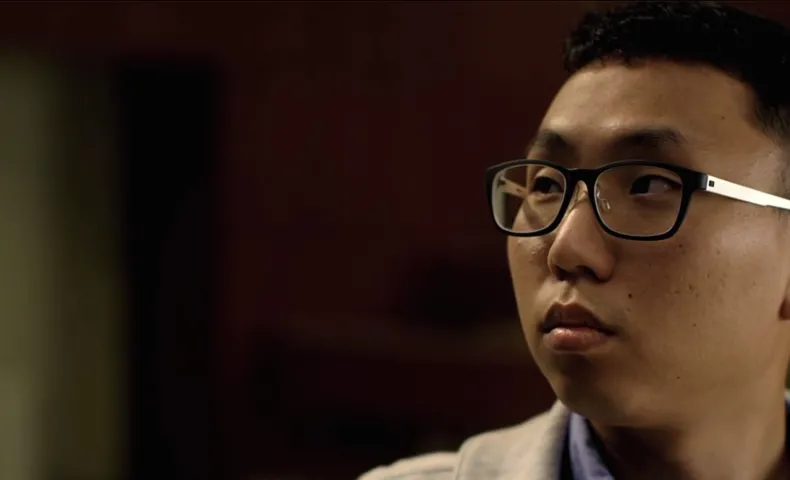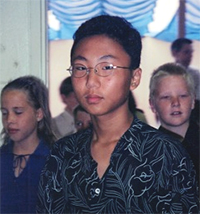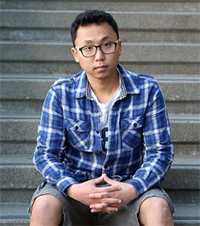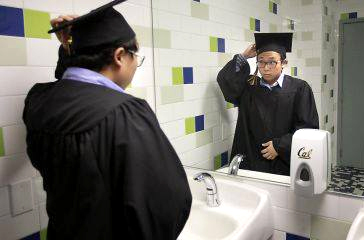 Photo by thedreamisnow.org
Photo by thedreamisnow.org
Terrence Park
When Joon-Suk Park was 10 years old, his mother brought him and his sisters from Seoul, South Korea to the United States on a tourist visa that soon expired. His parents were recently separated at the time, and his mother was intent on making sure her children got a high-quality education at an American college or university. After renaming himself “Terrence” in an effort to assimilate in his new country, he completed high school and enrolled at U.C. Berkeley. At Cal, Terrence became an advocate for the federal DREAM Act, which would offer a pathway to citizenship for undocumented students.
The move to the U.S. was a little bit shocking. I was a regular kid back in Seoul. I was doing fine and all of my friends were there. Why should we move? My mother didn’t tell me why we were leaving because there were some very sensitive issues with my dad. I had a sense of some trouble, but the concept of divorce or separation seemed very distant from my family. When you’re young you think that you will always be in a happy family. Everything can change so fast.
At that time in Korea, it was the man who made the living. Korea has changed a lot, but back then my mom was required to be a housewife and she had no source of income. She had gone to a women’s college and was a public high school teacher when she met my dad, but once she got married she had to stay at home.
The Smart Kid Who Didn’t Do His Homework
When my mom and dad separated, my mom decided to take us and she made the determination that the best thing she could do for her kids was to give us an education. And when it came to getting a good education, the United States was the best place to be. In terms of a college education, I don’t think there’s any country that will ever catch up with the United States. Here you can study what you want to. If you’re good at art, then you study art. If you’re good at math, you study math. But in Korea, every parent wants their child to become a doctor or engineer, so you have tens of thousands of students applying to the three best colleges and maybe only one or two percent can get in. That’s tough on everyone. If I were to have stayed in Korea, I definitely wouldn’t have made it to college. I could never have been a top one-percent kid. I was the smart kid who didn’t do his homework.

Terrence and his mother and sisters were the first members of their family to come to the United States. They had no relatives or friends in the country. An aunt who had traveled to the United States several times just to visit helped Terrence’s mother with the travel arrangements and told her how to get a tourist visa. The family found an apartment in San Diego. Terrence’s mother immediately entered the workforce and the children started school.
My mother’s first jobs were at Korean markets where she could speak Korean all the time. Sometimes she worked several jobs at a time. She’s always had to take jobs that didn’t require English communication and those turned out to be dishwashing and cleaning, stuff like that. I remember being pretty mad at my dad. I called him a few times and asked him to send us some money, to support us financially, but he never did.
My mother always wanted to learn English, but never had the chance while she was in Korea. By the time she moved here she was already in her 40s so it was hard to learn a new language. But she’s still trying. In fact, she’s going to school right now, taking some free night classes.
My Mom’s Big Threat
I was a little bit of a troublemaker in school, I didn’t study at all. My sisters got straight As from the beginning, they were model students, but my mom got stressed out because of me. In my first year of high school, I remember my biology teacher called me in for a one-on-one with my mom. He pulled out my grades and said, “Here’s what he got on his exam, very good scores, but here’s what he got on his homework—fail, fail, fail.” My mom was really mad at me. She said, “Get prepared, we’re going back to Korea.” That was a big threat, because by the time I was in ninth grade I had already assimilated to the culture and my life here. I wanted to stay. The next semester I got straight As. My mom knew the means to control me—her whole reason for coming here was so that we could get a quality education.
The American Dream and the Korean Mothers’ Dream
During his senior year in high school, Terrence was accepted into a number of four-year colleges. While applying for financial aid, he asked his mother for his Social Security number. She said he didn’t have one. After her original visa expired, Terrence’s mother and her children had joined the ranks of 11 million aspiring Americans without any documentation. Terrence ended up enrolling at Irvine Valley College, a two-year community college in Irvine, California.
Applying for financial aid was when I figured out about my immigration status. My mother had purposefully protected me from all that. She felt that if she had told me any earlier, I would have just given up. She knew me—I would have said, “Okay, I’m not going to go to four-year university.” She wanted me to study as hard as I could and see what happened.
The American dream that we should be talking about is the dream of feeding our families. People are looking for some hope to live by, that’s why they come to America.
There was no way we could pay for a four-year college, so I went for two years to community college. I knew that my sisters were going to get into the better colleges and I thought maybe I could sacrifice to help them afford to go to a university. My mom was disappointed. She was pretty sad at my high school graduation. She hated the fact that I couldn’t go to four-year school. A lot of people have this fixed notion that smart people have to start at a four-year college. That’s just not true.
While I was at community college, my mom and I worked together to be able to afford the first year of my sisters’ college tuition. During that time I worked in a laundry—that was very tough labor—and I also worked as a private tutor. Within two years we were able to afford the first year of both of my sisters’ tuition. They had kept up their straight As and were able to go to U.C. Berkeley immediately after high school. One of them studied nutritional science and the other majored in toxicology. We’ve all studied math and science, the dream of all Korean mothers.
After their first year at Berkeley, my sisters took a year off and we all worked together to try to save money for the next year. My sisters tutored and did nanny work and together we earned just enough money for three semesters—one semester for all of us. By then I was able to transfer into Berkeley as a junior and we all went to Cal together. After that, we thought we might have to take off another year and work again.
Saved by the DREAM Act
In late 2011, state lawmakers passed the California DREAM Act, which provides undocumented students with access to private scholarships and state-supported financial aid. Within months, Terrence and his sisters received scholarship support to complete their Berkeley studies.
We didn’t have to go back to work and all three of us were all able to finish our undergraduate education right away. We really got lucky, the timing was perfect. We didn’t have to worry about tuition, all we had to earn was living expenses. To save money on housing my mom decided to move to Berkeley and we all lived in the same place near campus.

During his time at Berkeley, Terrence became active in a variety of extracurricular activities, from student government and the campus newspaper to the Math Club. He also benefited from the university’s leadership in providing support to undocumented students. Berkeley’s Undocumented Student Program provides a variety of guidance and support services to these students at Cal. The program is housed at the Robert D. Haas Dreamer Resource Center. The Haas, Jr. Fund in 2012 announced that it was making a $1 million grant to Cal for scholarships for undocumented students.
When I first came to Berkeley, I was hesitant to talk about my status, but then I met the undocumented student counselor at Berkeley, Meng So. I trusted him right away, and I told him my whole story. He’s probably the first person who I shared every aspect of my life with. He told me what my rights were, and after we talked I felt that I’d be okay. He’s such a great resource, when he gives advice he thinks about everything from the student’s perspective. That’s one thing about going to Berkeley, all of these people were trying to help us, there were so many individuals who cared about us. I didn’t make an attempt to find that kind of assistance, but when people heard my story they just wanted to help.
The Real Cost of Denying Citizenship
While he was finishing his studies at Cal, Terrence appeared in a YouTube “chalkboard talk” explaining the economic implications of enacting the federal DREAM Act, which would offer a path to citizenship for undocumented young people. The video was directed by noted documentarian Davis Guggenheim and produced and promoted by The Dream Is Now, a coalition of immigrant rights organizations and their allies working for common-sense immigration reform.
I talk in the video about how there are 2.1 million undocumented students currently in America. What would happen if we just deported all of them? And what would happen if we let them stay, work full-time jobs, pay taxes, and spend their earnings here? Obviously the latter plan is much more reasonable than the first. It costs a lot of money to deport an individual; it comes to billions of dollars and has a huge economic impact. We added up what undocumented college students could contribute to the economy if the government would let us stay here and become U.S. citizens. It’s in the billions. The DREAM Act would be a plus-plus in terms of human rights and in terms of economics. I don’t know why people keep arguing that we’re losing money on immigrants. It’s an investment—you spend some money, but you get more back.
The DREAM Act would be a plus-plus in terms of human rights and in terms of economics.

After graduating from Berkeley in the spring of 2013, Terrence enrolled in graduate school at Harvard University, where he will be studying biostatistics in the School of Public Health. For Terrence, “biostatistics is all about using numbers to help people.” He now has temporary work papers and even a driver’s license because of President Obama’s Deferred Action for Childhood Arrivals (DACA) program.
Is It Safe to Fly to Harvard?
My mom has always been the one who was worried about our legal problems, our status. She would read news articles and warn me not to go to academic conferences that were outside of California. She had heard the story of this high school kid who tried to go to a tournament, got caught at the state border, and was deported. She told me all these stories of really smart high school and college students who would get caught leaving the state for competitions and research presentations. She was always afraid, not for herself—but of something happening to one of us.
People ask if I am safe taking the flight to Harvard. Although DACA won’t completely prevent me from getting deported, it makes me a low-priority target. It allowed me to get a government-issued ID, which means I can get a driver’s license. I also got a two-year temporary Social Security number, which is renewable unless the government changes the policy in the meantime. And the Social Security number allowed me to get a job and made it possible for me to get a bank account.
Harvard offered me a 40-percent tuition discount, but I still have to pay for the rest. At least now I can legally work, like any other student.
More than Just a Piece of Paper: We Should Be Thinking About Why People Come Here
When I tell people about my immigration situation, they sometimes ask me, “Did you come here legally or illegally?” I try to explain that we came here legally at first, with a visa, but that we’re now in the middle of a long complicated immigration process. At that point, people differentiate me from those who came here “illegally.” I don’t like that term at all and I don’t like being separated from the others just because I came here as a child and because we came here legally at first. People think I’m different from people who hopped a border, but it doesn’t matter how you came here, it’s all just about a piece of paper. We should be thinking about why people come here. The American dream that we should be talking about is the dream of feeding our families. People are looking for some hope to live by, that’s why they come to America.